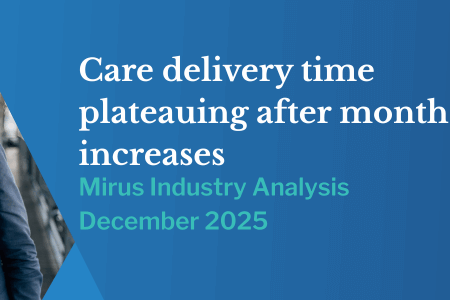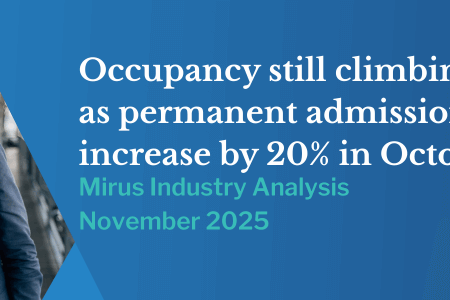How 3 aged care executives are getting reform ready
June 12, 2025 | Provider Perspectives

By Dotti Gill, Marketing Manager
In a recent webinar, a panel of aged care leaders—Lucy O’Flaherty, CEO at Columbia Aged Care; Verity Leith, General Manager of Residential Services at Benetas; and Justin Dover, CEO at Alino Living—shared their organisations’ journeys preparing for the reforms coming into effect in November 2025. They explored practical strategies, challenges, and future-focused initiatives designed to meet the demands of a rights-based, person-centred aged care system.
Anita Courtney, Principal at Russell Kennedy Lawyers, offered legal insights on the evolving frameworks, helping to clarify some of the uncertainties providers face as the reforms approach.
Let’s take a closer look at how each organisation is navigating this complex transformation.

Lucy’s Strategy: Transforming Policies and Embracing AI
Lucy O’Flaherty detailed Columbia Aged Care’s structured approach to the reforms, emphasising strategic planning and sector collaboration. Her team has worked closely with their board to integrate reform requirements, ensuring governance aligns with heightened expectations. “Strategically, we’ve been working with our board for some time to ensure we understand the changes,” Lucy said, noting that board members have completed governance training to meet increased responsibilities.
A key initiative has been a comprehensive policy overhaul to adopt a rights-based framework. “We’ve taken a fairly drastic approach, essentially throwing everything out and rewriting our entire policies and procedures manual and standard operating procedures,” Lucy explained. This shift prioritises resident experiences over task-oriented processes, with policies now focusing on “how does the resident experience X, Y, and Z, how does a staff member know that that experience is a positive one?” Columbia conducted a risk assessment to identify compliance gaps, leveraging partnerships with larger providers. “We couldn’t have done this without the support of larger providers we collaborate with,” she highlighted.To address potential delays in regulatory guidance, Columbia is scenario planning with vendors. “We’re preparing for scenarios where information might not arrive in time,” Lucy noted. They’ve adopted AI, using Google’s Gemini to check policy compliance with the Act and standards, identifying areas for refinement. Looking ahead, Columbia is exploring customer journey mapping, inspired by hospitality, to monitor resident experiences and gather ongoing feedback.
Verity’s Plan: Fostering Cultural Change and Upgrading IT
Verity Leith described Benetas’ efforts to embed a rights-based culture while tackling operational challenges. An executive-level working party, including operational leaders, is driving the reforms, with significant changes in the support-at-home space. In residential care, Verity noted, “The standards, apart from Standard 6 for food and nutrition, are largely similar but written in a more rights-based framework, requiring a change in staff thinking.” This shift challenges task-focused staff to prioritise person-centred care, a process Verity expects will take “12 to 18 months, if not more.”
Verity acknowledged delays in regulatory clarity, stating, “Software vendors are as much in the dark as we are, playing catch-up.” She advocated for a pragmatic approach: “I believe many things won’t be ready in time, and we need to relax about it. I don’t think the department will penalise providers.” Benetas is investing in an AI-driven care management system to reduce documentation time and automate data collection for compliance, such as the National Quality Indicator Program (NQIP). Verity emphasised workforce changes, stating, “We’re breaking down barriers between carers and lifestyle staff, ensuring everyone is responsible for residents’ quality of life.” This requires enhanced recruitment, screening, and performance management to build a skilled workforce.
Looking forward, Benetas anticipates a more subacute aged care sector, requiring nurses trained in advanced procedures like IV antibiotics and blood transfusions, as residents enter care later with complex needs. Verity’s CEO, Sandra, has ensured board readiness through reform-focused training.
Justin’s Focus: Ensuring Agility with AI and Future Planning
Justin Dover outlined Alino Living’s agile preparation, shaped by a 2020 merger and ongoing regulatory uncertainty. His quality team has repeatedly mapped processes to align with the Act, while the board has clarified governance versus operational roles. “We’ve focused heavily on the board, shifting from governance to understanding operational lines, which can get blurry with the new Act,” Justin said. Extensive education for staff and board members is ongoing, as “this is a journey that will take time.”
Justin emphasised AI’s role, with Alino developing an AI reporting tool for finance and compliance, using AI in care time audits, and generating care statements via systems like Domino and collaborating with Mirus to reduce manual workload. AI also optimises finance systems, freeing resources for frontline care. Looking ahead, Justin envisions redefining care models and infrastructure over the next 5–10 years to ensure long-term viability.
Long-term, Justin is planning for aged care’s evolution over 5 to 10 years, asking, “What does residential aged care look like… what is our model of care going to look like? What do our buildings need to look like?” He emphasised, “If we don’t get this right, we don’t have a business,” highlighting the need for agile systems to adapt as the Act evolves
Anita’s Guidance: Navigating Legal Uncertainty with Flexible Systems
Anita Courtney provided critical legal insights, noting the challenge of navigating 700–800 pages of draft rules without transitional guidance. “Everything we have is still in draft… and we still don’t have the transitional rules,” she said. Key changes include higher everyday living fees, which are no longer mandatory and require agreements signed on or after a resident’s start day, with a 28-day cooling-off period. Anita advised, “I suggest setting up contracts for maximum flexibility” to adapt if services aren’t taken up.
Providers must implement financial and prudential management systems focusing on decisions benefiting care recipients. Enhanced complaints and whistleblower protections are broader, with Anita suggesting, “Treat complaints as complaints unless specified as whistleblower disclosures” to streamline processes. These require separate internal and public systems, annual training, and monthly reminders to stakeholders. Record-keeping mandates seven years from creation, and associated providers face increased accountability, requiring contract registers and notifications.
Anita emphasised planning amid uncertainty: “Having a plan for compliance is key, as care delivery is what matters most.” She acknowledged the challenge, noting, “I’ve been through two reforms… Now, almost halfway through the year, we still lack all drafts,” urging providers to prioritise care while building adaptable systems.
Key Takeaways for Aged Care Providers
The panelists’ strategies offer practical guidance for reform readiness:
- Policy and Governance Overhaul: Lucy’s comprehensive policy rewrite ensures a rights-based approach, as she noted, “We’ve removed task-oriented elements, shifting from prescriptive to experiential.”
- Cultural and Workforce Shift: Verity’s focus on person-centred care and workforce upskilling addresses the cultural transition, with her advice to “relax” about delays emphasising pragmatism.
- AI for Efficiency: Justin’s AI tools streamline compliance and care, as he stated, “Automating this helps staff focus on caring, not paperwork.”
- Flexible Compliance Plans: Anita’s guidance on adaptable contracts mitigates uncertainty, with her reminder that “a perfect whistleblower policy isn’t critical” if a plan exists.
The webinar highlighted the importance of collaboration, AI-driven efficiency, and strategic planning to meet the 2025 reforms while prioritising resident experiences. Providers must build adaptable systems to navigate evolving regulations and deliver exceptional care.
You can watch a recording of the webinar here.
How We Can Help
Ready to Get Started on Your AI Journey? The panelists shared a clear message: AI is emerging as a powerful enabler—not a replacement—in aged care. Used well, it’s helping organisations streamline compliance, reduce admin burdens, and improve resident outcomes.
Mirus AI is built to support this shift. From simplifying care time audits to generating accurate care statements and surfacing actionable insights, our tools help you harness AI with confidence.
Want to know what AI could look like in your organisation? Talk to us about Mirus AI.
Interested in tailored support for your reform readiness? With the new Aged Care Act now set to take effect on 1 November 2025, providers have more time—but also greater expectations—around preparedness. Now is the time to act.
Our Aged Care Reform Transition Support Program is designed to help you prepare with clarity and confidence. Whether you’re a residential or home care provider, we offer:
- Tailored guidance to align strategies with your organisation’s structure, goals, and readiness.
- Data-driven insights to help you meet care obligations, optimise funding, and track progress.
- Regulatory expertise to support your compliance with the Strengthened Quality Standards and new legislative requirements.
- Leadership and change support to help your teams adapt and lead through reform. Request a call back (button – link to Aged Care Reform Transition Support form


